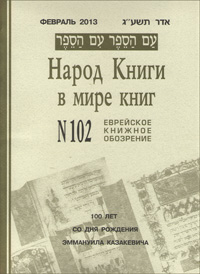The People of the Book in the World of Books is a Russian bimonthly publication for serious readers with Jewish interests. Our English website includes only the summaries of the published articles. To access the complete text of them, please visit the Russian version of this website.

|
||
|
This issue of the magazine includes:
• Names: Emmanuil Kazakevich (1913–1962)
Prominent Russian writer Emmanuil Kazakevich launched his literary career in the 1930s as a Yiddish poet. His first collection of poems was published in 1932 in Birobidzhan: it was the first book published in the area that soon would be proclaimed the Jewish Autonomous Region. In 1937, during the peak of Stalin’s purges, he escaped from the Far East to Moscow. He thus managed to survive during a period when many leading public and cultural figures in Birobidzhan were arrested and executed. Several books of his poetry and essays in Yiddish were published in the pre-war years. In 1941, Kazakevich volunteered for the Red Army. His war service took him from the rank of private to assistant head of intelligence in one of the Soviet armies that fought in the Battle of Berlin. Right after the war, he began writing prose in Russian. His war experiences were the major subject of his works. His debut novel Zvezda (The Star, 1947) was a stunning success and received the Soviet Union’s most prestigious literary award at the time, the Stalin Prize. Kazakevich himself translated this book into Yiddish; it was published in Moscow under the title Grine shotns (Green Shadows). It was his last literary work in Yiddish. His case was in a way unique: he managed not just to “move” from “minority” Yiddish literature into Russian literature but also to become a classic Soviet author. The article, dedicated to the hundredth anniversary of Kazakevich’s birth, analyzes his legacy and emphasizes his tragic fate: he died from cancer at the age of forty-nine full of various plans, ideas, and works that had been started and only partly written. Among his unfulfilled ideas was an autobiographical novel under the noteworthy title Rabinovich.
• Looking Through Russian Literary Magazines: Novels and Articles of Jewish Interest
• Jewish Calendar of Significant Dates: March–April 2013
• Bibliography: 50 New Books |


